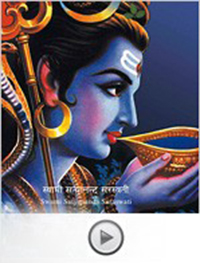
Swamiji will show us the path to Lord Shiva’s infinite compassion as he walks us through the methodology of the puja, from a beginners practice all the way to the advanced, which includes special knowledge about the fire ceremony.
Each class promises to be a great learning event as we open the forum to our online viewers for a Question and Answer session directly with Shree Maa and Swamiji.
You won’t want to miss this one! Join us on our Live Webcam starting Tuesday, February 18th!
Class One:
In this class, Swamiji explains the universality of God and the ever inspiring Sadhana Panchakam by Adi Shankaracharya. Swamiji says that Lord Shiva is the Consciousness of Infinite Goodness. Dive into this class and enjoy the Wisdom and Light of the Consciousness of Infinite Goodness.
Class Two:
Swamiji translates and explains the Shiva Sankalpa Stotram, which is full of wisdom and inspiration. He also answers devotee’s questions, including a full explanation of when to do normal and Manasic (mental) Pujas.
Class Three:
In this class, Swamiji speaks about the delightful worship of Lord Ganesh. He translates the great mantras of the Highest Meaning of Ganesh and the 108 names of Ganesh. Swamiji also answers many question about the worship of Lord Ganapati.
Class Four:
Swamiji continues the Shiva Puja by explaining the Punya Havachan and the Swasti Vachana, the establishment of purified water and the beginning of the establishment of the pot or Kalasha. Swamiji also gives an in-depth explanation of the use of Mudras.
Class Five:
Swamiji describes the system of worship for establishing life in the Kalasha, the Sacred Pot. By this system we learn to establish divinity everywhere. He also answers many questions related to the practice.
Class Six:
In this class, Swamiji explains the establishment of the Vishasharghya (conch shell offering) and the practices of Bhuta Shuddhi (purification of the elements) and Bhutapsarana (dispersion of inimical energies). Bhuta Shuddhi involves the reciting of the bija mantras of the chakras. Swamiji explains many subtleties about this practice and answers questions from devotees.
Class Seven:
Swamiji explains the process of Neti, washing the sinuses, and Pranayama, control of the breath. He also teaches the practices of establishing the letters of the Sanskrit alphabet in the different parts of the body, as well as the worship of the Divine Mother’s body. This class is filled with great wisdom.
Class Eight:
In this class Swamiji begins by describing the Shiva Dhyanam, the blissful meditation on the form of Shiva. These verses describe the divine qualities of Shiva and help us to absorb our mind in him.
Class Nine:
In this class Swamiji explains the system of Sthapana, establishing the deity on the altar, and the Puja Naivedya, the offerings of worship. He explains the meaning of the offerings and answers questions related to them.
Class Ten:
This class contains two videos. In the first video Swamiji begins with the explanation of the Yajna Paddhoti, the system of worship with the Divine Fire. The fire of the Yajna outside reflects the light of meditation burning inside. The method for worshiping the yantra is also explained in this class along with its meaning and purpose. In the second video Swamiji demonstrates how to draw the yantra.
Class Eleven:
In this class Swamiji continues teaching the system for inviting and worshiping the Divine Fire. He explains how to establish life in the fire and the system for worshiping the fire, before beginning the fire ceremony. He also answers many questions related to the practice.
Class Twelve:
In this class Swamiji begins the translation and explanation of the Shiva Sahasranam, the Thousand Names of Lord Shiva. He also gives an in-depth explanation of the meaning of several names in response to questions from devotees.
Class Thirteen:
In this class Swamiji continues his translation of the Shiva Sahasranam, the Thousand Names of Shiva. This class goes from name 301 to 700. Swamiji also explains the reason for chanting a Sahasranam rather than simply chanting one mantra a 1000 times.
Class Fourteen:
In this class Swamiji completes his translation of the Shiva Sahasranam, with names 701 to 1008. He answers questions on the meaning of names as well as on the true meaning of renunciation.
Class Fifteen:
In this class Swamiji translates and explains the mantras for concluding the Homa. This includes the Sarvato Bhadramandala Devata Homa and Purnahuti. Swamiji also joyful translates the Shiva Arati.
Class Sixteen:
In this class Swamiji explains several famous stotrams for Lord Shiva, including Shivo’ham, Purusha Suktam, Rudrashtakam and Lingashtakam.
Class Seventeen:
In this video Swamiji completes the explanation of the Advanced Shiva Puja with the Shiva Panchakshara Stotram, Kaupina Panchakam, and the Shiva Chalisa.
Q&A:
Class Eighteen:
In this class Shree Maa and Swamiji perform the Advanced Shiva Puja. They start the puja at the beginning of the book and proceed up until the Yajna Paddhoti. Click Here to view some awesome pictures of this sacred puja!
Class Nineteen will continue with the Yajna Paddhoti and cover the rest of the book.
Class Nineteen:
In this class Swamiji demonstrates how to invite and establish the Divine Fire. He also recites the Shiva Sahasranam in Sanskrit with oblations to the fire.
Class Twenty:
In this class Swamiji finishes the recitation of the Shiva Puja with Shiva’s Arati, the Pranam Mantras,and the Stotrams in the Appendix. Specifically, this video includes Shiva Arati, Purusha Suktam, Rudrashtakam, Lingashtakam, Shiva Panchakshara Stotram, Bhava Sagara, Kaupina Panchakam and Shiva Chalisa.
